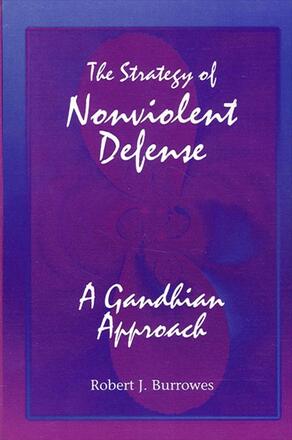
The Strategy of Nonviolent Defense
A Gandhian Approach
Alternative formats available from:
Addresses the question of whether nonviolent defense can be an effective strategy against military violence. Drawing from the strategic theory of Carl von Clausewitz, the nonviolence of Mahatma Gandhi, and recent human needs and conflict theory, Burrowes develops a new strategic theory of nonviolent defense.
Description
Because of the way in which the history of nonviolence has been marginalized, relatively few people have a sense of the rich history of nonviolent struggle or realize that it can be systematically planned and applied. Nevertheless, the historical record illustrates that nonviolent struggle is a powerful form of political action. But can it be effective against military aggression?
The Strategy of Nonviolent Defense answers this question in the affirmative by first defining the notion of "social cosmology"—the four mutually reinforcing features that determine the character of any society. It then devotes attention to strategies for dealing with conflict, in particular, to developing a strategic theory and framework for planning a strategy of nonviolent defense. In order to develop this theory, Burrowes synthesizes insights drawn from the strategic theory of Carl von Clausewitz, the nonviolence of Mahatma Gandhi, and recent human needs and conflict theory.
Robert J. Burrowes has been a member of the Australian Nonviolence Network since 1981 and has been involved in many nonviolent action campaigns. He is best known for his war tax resistance, his involvement in the campaign of the Melbourne Rainforest Action Group, and his membership in the Gulf Peace Team. He now devotes all of his time to nonviolent activism, education, and research.
Reviews
"The author does an exceptional job at questioning underlying assumptions (for example patriarchy, political realism, and the elitism of states). As a scholar in the area of nonviolent defense in my own right, I found myself personally benefited by this book's theme of moving beyond a statist perspective on conflict toward one which recognizes the non-satisfying of human needs as the cause of conflict. " — Norman C. Freund, author of Nonviolent Defense: A Philosophical Inquiry into Applied Nonviolence
"The author develops in clear prose, and with impressive documentation, a persuasive approach to a strategy of nonviolent defense, which has not been done before in such a systematic and comprehensive manner. The book's focus is of great importance for conflict theory, international relations, and the role of violence in inter-group relations. " — Richard Falk, Princeton University